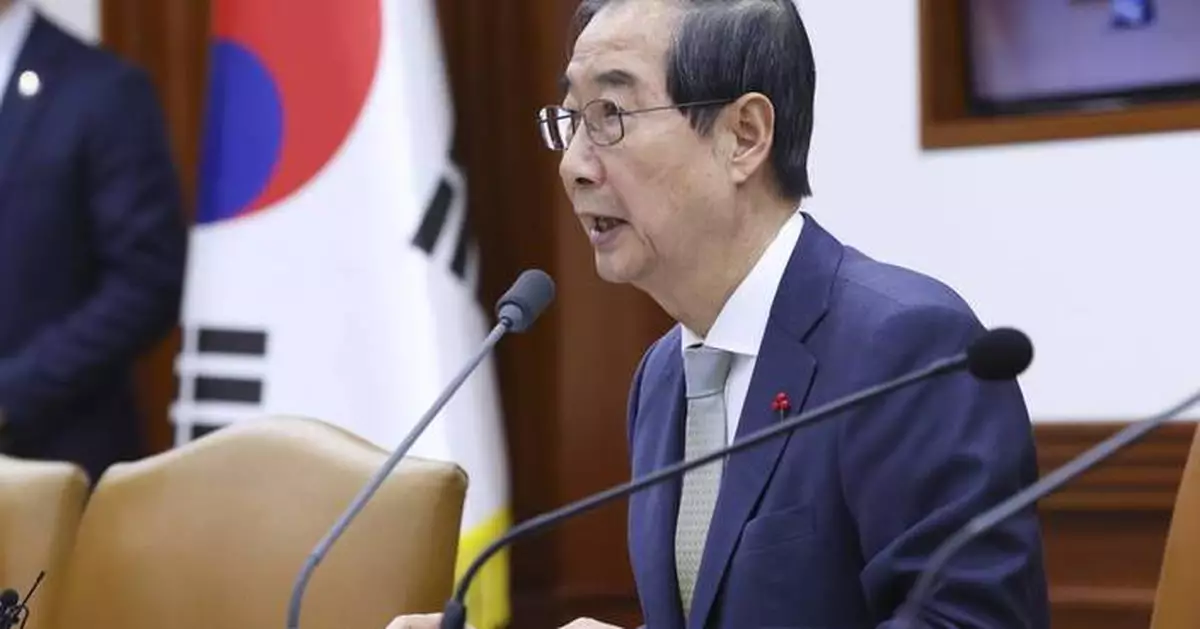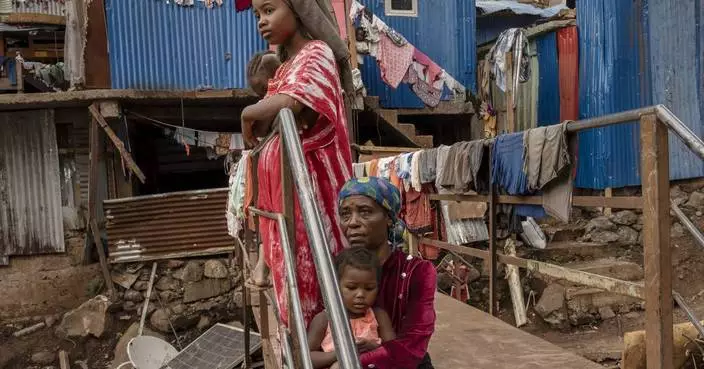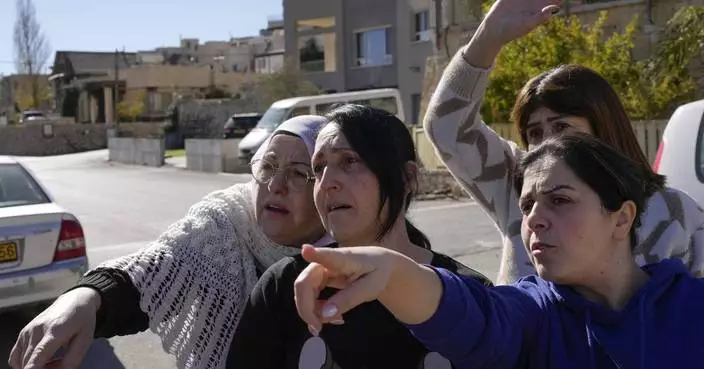SEOUL, South Korea (AP) — South Korea’s acting leader on Thursday vetoed a spate of contentious bills sponsored by the main opposition party, deepening political strife in the wake of parliament’s impeachment of President Yoon Suk Yeol.
The ruling and opposition parties have been bickering over how much authority Prime Minister Han Duck-soo, the country's No. 2 official, has assumed since the opposition-controlled National Assembly last Saturday voted to suspend Yoon’s presidential powers over his short-lived Dec. 3 martial law. The Constitutional Court is to determine whether to formally dismiss the conservative Yoon as president or reinstate him.
Click to Gallery
Seok Dong-hyeon, a lawyer and spokesperson for South Korea's impeached President Yoon Suk Yeol's emerging legal team, speaks during a media briefing at his office in Seoul, Thursday, Dec. 19, 2024. (AP Photo/Ahn Young-joon)
Seok Dong-hyeon, a lawyer and spokesperson for South Korea's impeached President Yoon Suk Yeol's emerging legal team, speaks during a media briefing at his office in Seoul, Thursday, Dec. 19, 2024. (AP Photo/Ahn Young-joon)
In this photo released by South Korean President Office via Yonhap, South Korean President Yoon Suk Yeol speaks at the presidential residence in Seoul, South Korea, Saturday, Dec. 14, 2024. (South Korean Presidential Office/Yonhap via AP)
Members of civic groups shout slogans during a news conference demanding the arrest of President Yoon Suk Yeol near the presidential residence in Seoul, South Korea, Tuesday, Dec. 17, 2024. The letters read "Immediately arrest Yoon Suk Yeol." (AP Photo/Lee Jin-man)
Supporters for impeached South Korean President Yoon Suk Yeol stage a rally against his impeachment near the Seoul Central District Court in Seoul, South Korea, Tuesday, Dec. 17, 2024. The signs read "Oppose the impeachment and Arrest opposition Democratic Party leader Lee Jae-myung." (AP Photo/Ahn Young-joon)
South Korea's Prime Minister Han Duck-soo, who became the country's acting leader after parliament’s impeachment of President Yoon Suk Yeol, speaks during a meeting at the government complex in Seoul, South Korea, Thursday, Dec. 19, 2024. (Han sang-kyun/Yonhap via AP)
Law enforcement authorities are also separately investigating whether Yoon's martial law enforcement amounted to rebellion. Yoon's defense minister, police chief and several other military commanders have already been arrested over the case. The main liberal opposition Democratic Party earlier considered impeaching Han as well for failing to stop Yoon's martial law declaration, but shelved the idea after he became acting leader.
Four of the six bills vetoed by Han were meant to introduce greater state financial assistance programs for the country’s agriculture and fisheries industries.
The most contentious bill is the Grain Management Act, which would require the government to buy surplus rice if the price drops too sharply to protect the country’s farming industry and promote its food sovereignty. Han said the bill would cause “immense” financial burdens on the government and eventually lead to further drops in rice prices.
Another controversial bill is the National Assembly Testimony Appraisal Act, which would give lawmakers more power to request people to attend parliament hearings and submit documents. Under the proposed legislation, individuals could no longer decline such requests by citing the protection of trade secrets or personal information.
The Democratic Party said the bill is necessary to determine the full details of Yoon’s martial law decree. But Han said the bill would likely infringe upon people’s privacy and that there are concerns among business leaders that key technology and company secrets could be leaked.
“I’m heavy-hearted because I’ve asked the National Assembly to discuss and act on the six bills again at a time when we desperately need cooperation among the government and the ruling and opposition parties,” Han said in televised comments at the start of a Cabinet Council meeting on Thursday. “But the government should make a responsible decision that prioritizes the principles of the Constitution and the future of our country.”
Democratic lawmaker and spokesperson Noh Jongmyun quickly criticized Han, warning him “not to cross a line,” adding, “We’ll immediately drag him down if he’s found to have collaborated with the rebellion.”
Han’s office later sent formal documents on his vetoes to the National Assembly. To enact a bill vetoed by a president, the parliament needs support from two-thirds of its 300 lawmakers. The Democratic Party and other small opposition parties together hold 192 seats.
Observers earlier speculated the Democratic Party would reconsider impeaching Han if he vetoed the bills.
Another source of contention between the rival parties is whether Han has the right to appoint three vacant justices' seats at the Constitutional Court, as filling the vacancies could affect the court's decision on Yoon.
The martial law enactment lasted only six hours, but it caused huge political turmoil in South Korea and set off alarms from its neighbors and diplomatic partners. Yoon sent hundreds of troops and police officers to the National Assembly to block its vote on his decree. But many lawmakers managed to enter a parliament hall and unanimously voted it down, forcing Yoon's Cabinet to lift it.
Yoon has defended his decree as an act of governance, saying it was a warning to the Democratic Party, which he said has been using its parliamentary majority to obstruct his agenda.
Meeting with foreign media on Thursday, Seok Dong-hyeon, a lawyer and spokesperson for Yoon’s emerging legal team, echoed Yoon’s assertion that his short-lived power grab didn’t amount to a rebellion. Seok said Yoon did not intend to paralyze the parliament and denied claims the president ordered the military to arrest his political opponents, including Democratic Party leader Lee Jae-myung.
“Regarding the charges of rebellion, he never even thought about it, so he cannot possibly agree to such an accusation,” Seok said.
“What kind of a rebellion is announced through a press conference broadcast to citizens, media and the whole world, as if he was saying, ‘I’m now about to commit a rebellion?'" Seok said. "When the National Assembly followed the constitutional procedure to lift martial law after two or three hours, we abided by that procedure.”
He said Yoon may appear in the Constitutional Court to directly defend his case. When asked whether Yoon would continue to ignore law enforcement’s requests to question him and search his office, Seok declined to give a specific answer, saying these matters would be handled by Yoon’s legal team, which he said is nearly assembled.

Seok Dong-hyeon, a lawyer and spokesperson for South Korea's impeached President Yoon Suk Yeol's emerging legal team, speaks during a media briefing at his office in Seoul, Thursday, Dec. 19, 2024. (AP Photo/Ahn Young-joon)
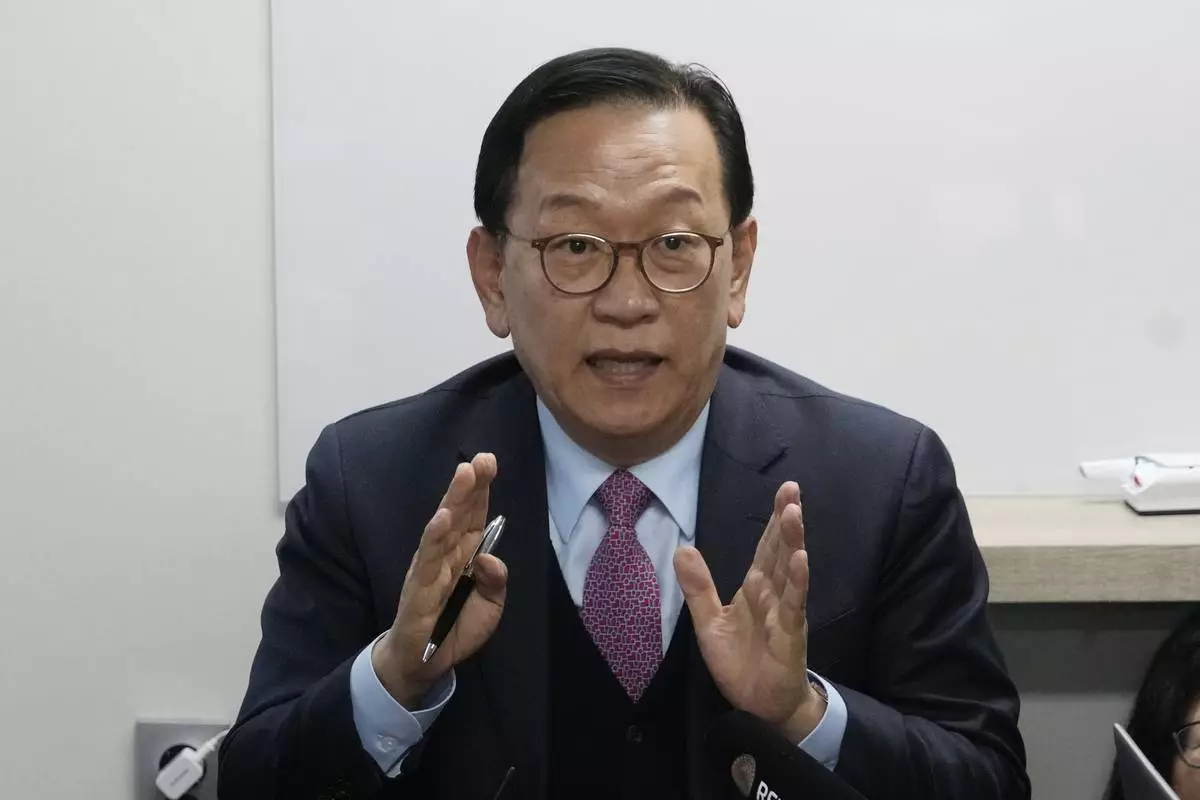
Seok Dong-hyeon, a lawyer and spokesperson for South Korea's impeached President Yoon Suk Yeol's emerging legal team, speaks during a media briefing at his office in Seoul, Thursday, Dec. 19, 2024. (AP Photo/Ahn Young-joon)
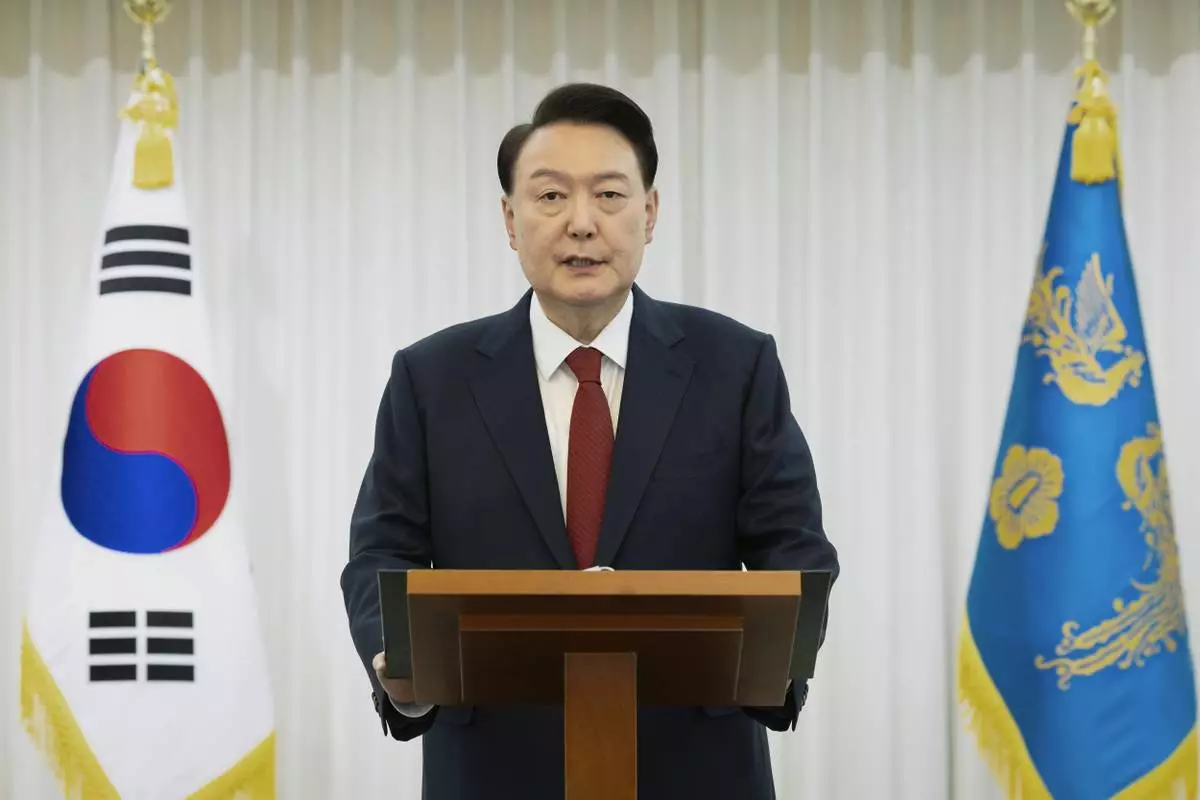
In this photo released by South Korean President Office via Yonhap, South Korean President Yoon Suk Yeol speaks at the presidential residence in Seoul, South Korea, Saturday, Dec. 14, 2024. (South Korean Presidential Office/Yonhap via AP)
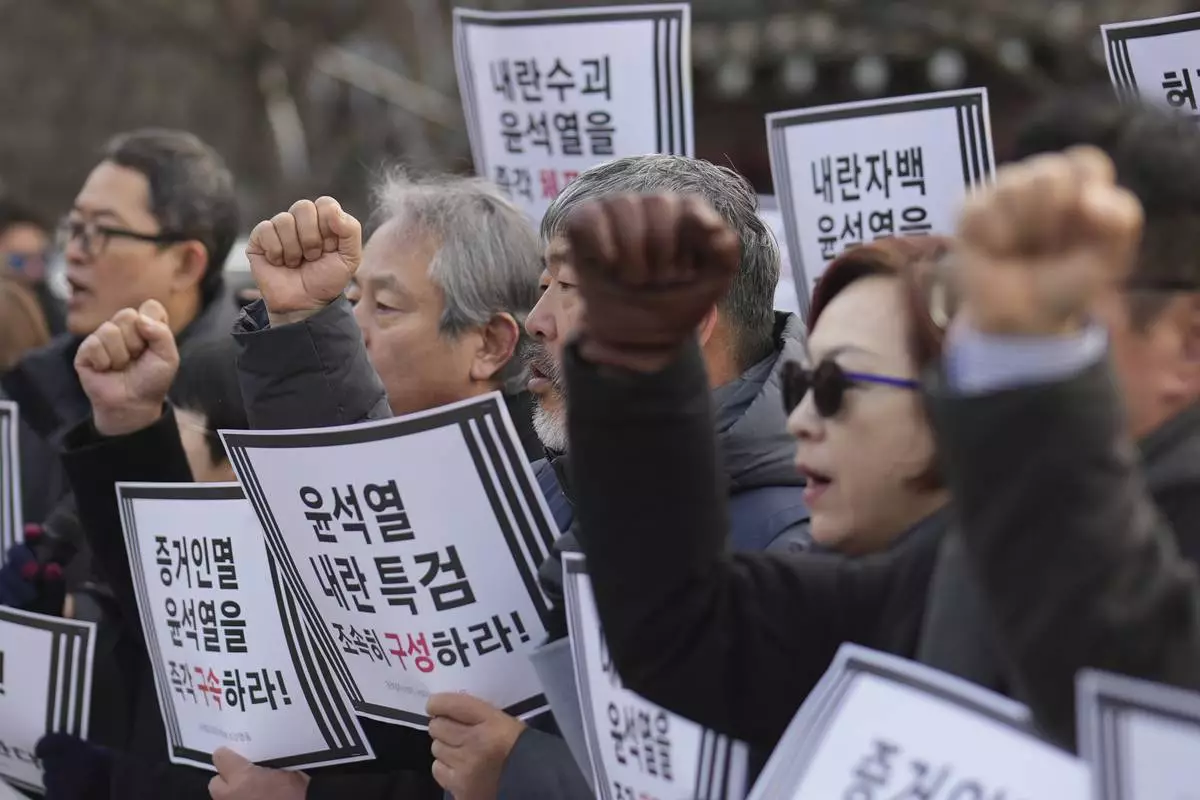
Members of civic groups shout slogans during a news conference demanding the arrest of President Yoon Suk Yeol near the presidential residence in Seoul, South Korea, Tuesday, Dec. 17, 2024. The letters read "Immediately arrest Yoon Suk Yeol." (AP Photo/Lee Jin-man)

Supporters for impeached South Korean President Yoon Suk Yeol stage a rally against his impeachment near the Seoul Central District Court in Seoul, South Korea, Tuesday, Dec. 17, 2024. The signs read "Oppose the impeachment and Arrest opposition Democratic Party leader Lee Jae-myung." (AP Photo/Ahn Young-joon)
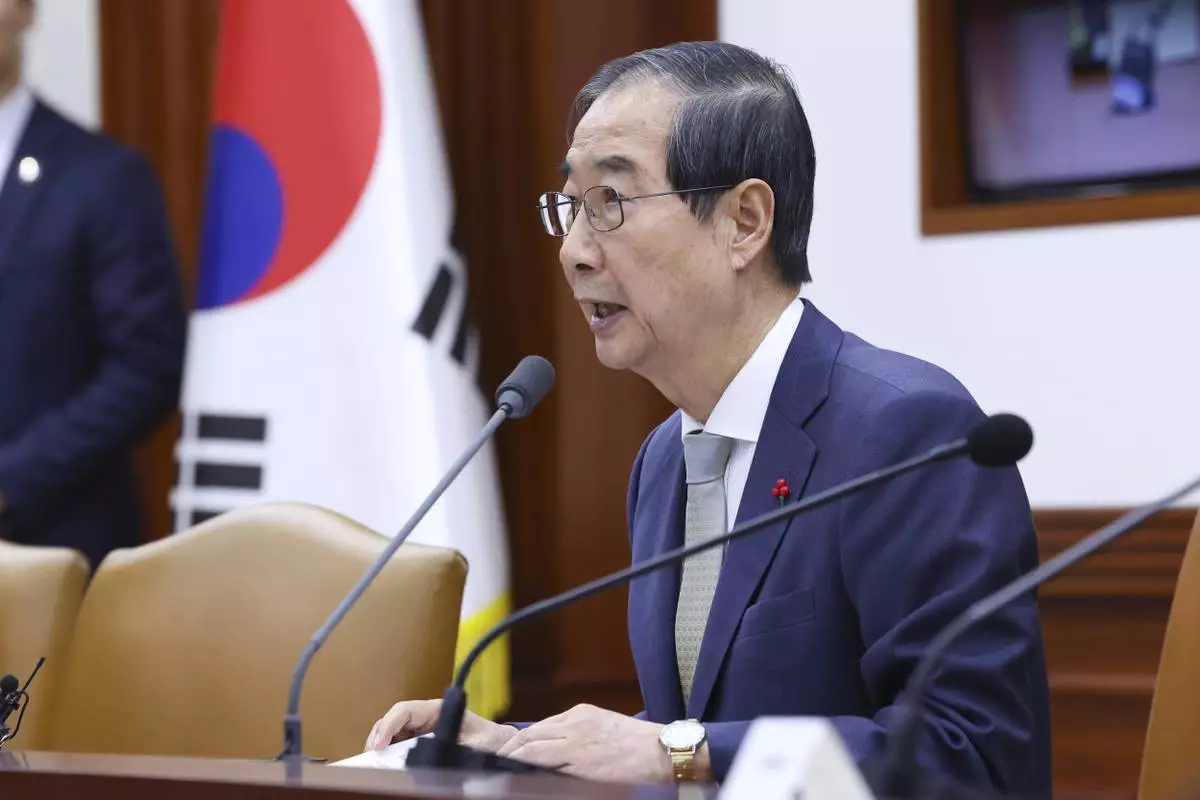
South Korea's Prime Minister Han Duck-soo, who became the country's acting leader after parliament’s impeachment of President Yoon Suk Yeol, speaks during a meeting at the government complex in Seoul, South Korea, Thursday, Dec. 19, 2024. (Han sang-kyun/Yonhap via AP)
AVIGNON, France (AP) — A French court on Thursday declared the ex-husband of Gisèle Pelicot guilty of aggravated rapes and all other charges against him.
The verdict for 72-year-old Dominique Pelicot was read by the lead judge of the court in Avignon, Roger Arata. He hasn't yet delivered the sentence, which can be up to 20 years imprisonment.
THIS IS A BREAKING NEWS UPDATE. AP’s earlier story follows below.
AVIGNON, France (AP) — A panel of five judges in France is delivering verdicts on Thursday for more than four dozen men charged with aggravated rape and sexual assault on Gisèle Pelicot in a historic case that has profoundly shaken the country over the past several months.
Among the men on trial is Dominique Pelicot, the now ex-husband of the 72-year-old grandmother who admitted that for years he knocked his wife of 50 years out with drugs so he and strangers he recruited online could abuse her while he filmed the assaults.
The appalling ordeal inflicted over nearly a decade on Gisèle Pelicot in what she thought was a loving marriage and her courage during the bruising and stunning trial have transformed the retired power company worker into a feminist hero of the nation.
Stretching over more than three months, the trial galvanized campaigners against sexual violence and spurred calls for tougher measures to stamp out rape culture.
Dominique Pelicot, also 72, and 49 other men were tried in the southern French city of Avignon for aggravated rape and attempted rape and face up to 20 years imprisonment if convicted.
Prosecutors asked that he get the maximum penalty and for sentences of 10 to 18 years for the others. They also requested a four-year prison term for another defendant who was tried for aggravated sexual assault.
The 51 men were all accused of having taken part in Dominique Pelicot's sordid rape and abuse fantasies that were acted out in the couple's retirement home in the small Provence town of Mazan and elsewhere.
Dominique Pelicot testified that he hid tranquilizers in food and drink that he gave his then wife, knocking her out so profoundly that he could do what he wanted to her for hours.
One of the men was on trial not for assaulting Gisèle Pelicot but for drugging and raping his own wife — with the help and drugs from Dominique Pelicot, who was also tried for raping the other man's wife.
The five judges were voting by secret ballot in their rulings, with a majority vote required to convict and also for the sentences of those found guilty.
Campaigners against sexual violence are hoping for exemplary prison terms and view the trial as a possible turning point in the fight against rape culture and the use of drugs to subdue victims.
Gisèle Pelicot's courage in waiving her right to anonymity as a survivor of sexual abuse and successfully pushing for the hearings and shocking evidence — including videos — to be heard in open court have fueled conversations both on a national level in France and among families, couples and groups of friends about how to better protect women and the role that men can play in pursuing that goal.
“Men are starting to talk to women — their girlfriends, mothers and friends — in ways they hadn’t before,” said Fanny Foures, 48, who joined other women from the feminist group Les Amazones in gluing messages of support for Gisèle Pelicot on walls around Avignon before the verdict.
“It was awkward at first, but now real dialogues are happening," she said.
“Some women are realizing, maybe for the first time, that their ex-husbands violated them, or that someone close to them committed abuse,” Foures added. “And men are starting to reckon with their own behavior or complicity — things they’ve ignored or failed to act on. It’s heavy, but it’s creating change.”
A large banner that campaigners hung on a city wall opposite the courthouse read, “MERCI GISELE” — thank you Gisèle.
Dominique Pelicot first came to the attention of police in September 2020, when a supermarket security guard caught him surreptitiously filming up women’s skirts.
Police subsequently found his library of homemade images documenting years of abuse inflicted on his wife — more than 20,000 photos and videos in all, stored on computer drives and catalogued in folders marked “abuse,” “her rapists,” “night alone” and other titles.
The abundance of evidence led police to the other defendants. In the videos, investigators counted 72 different abusers, but weren't able to identify them all.
Although some of the accused — including Dominique Pelicot — acknowledged that they were guilty of rape, many didn't, even in the face of video evidence. The hearings sparked wider debate in France about whether the country’s legal definition of rape should be expanded to include specific mention of consent.
Some defendants argued that Dominique Pelicot’s consent covered his wife, too. Some sought to excuse their behavior by insisting that they hadn’t intended to rape anyone when they responded to the husband’s invitations to come to their home. Some laid blame at his door, saying he misled them into thinking they were taking part in consensual kink.
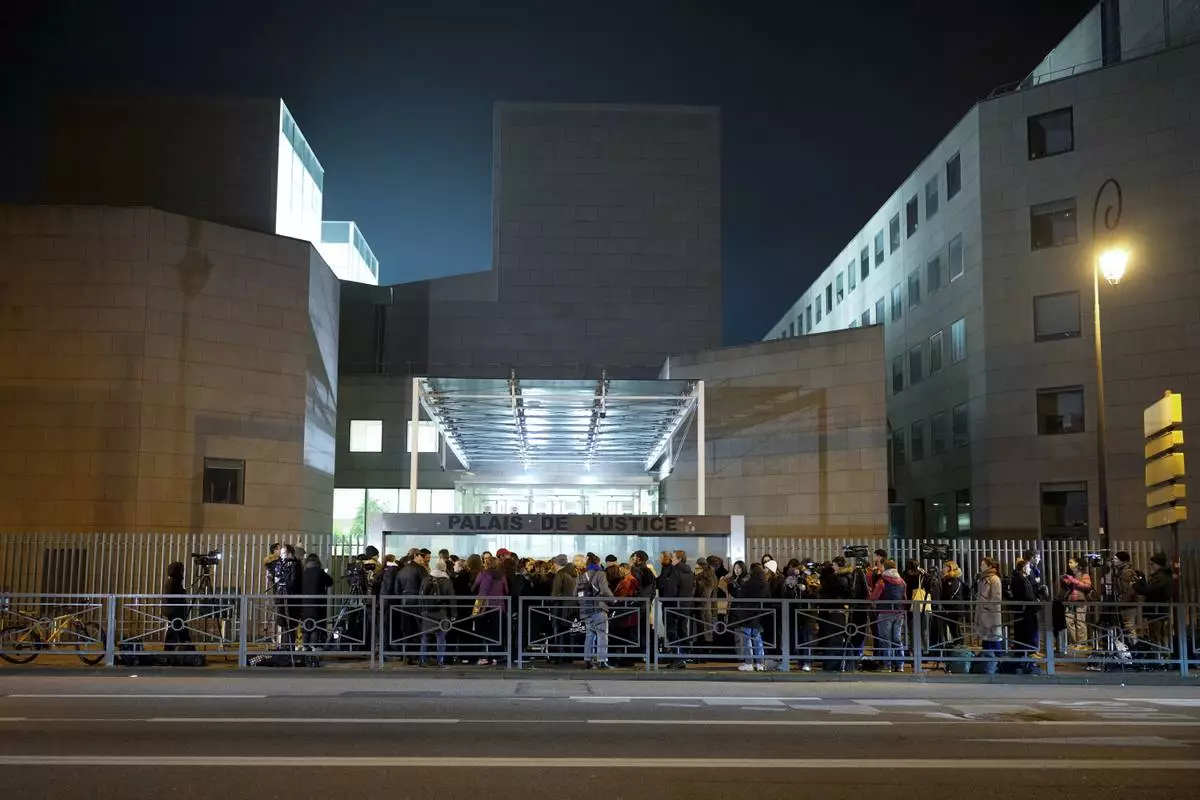
Media wait outside the courthouse of Avignon during the trial of four dozen men charged with aggravated rape and sexual assault on Gisèle Pelicot, in Avignon, southern France, Thursday, Dec. 19, 2024. (AP Photo/Lewis Joly)

Gisele Pelicot, who was allegedly drugged by her now former husband so that he and others could assault her, arrives at the court house in Avignon, southern France, Thursday, Dec. 19, 2024. (AP Photo/Lewis Joly)

Gisele Pelicot, who was allegedly drugged by her now former husband so that he and others could assault her, arrives at the court house in Avignon, southern France, Thursday, Dec. 19, 2024. (AP Photo/Lewis Joly)

Gisele Pelicot, who was allegedly drugged by her now former husband so that he and others could assault her, arrives at the court house in Avignon, southern France, Thursday, Dec. 19, 2024. (AP Photo/Lewis Joly)

Police officers stand guard inside the courthouse of Avignon during the trial of four dozen men charged with aggravated rape and sexual assault on Gisèle Pelicot, in Avignon, southern France, Thursday, Dec. 19, 2024. (AP Photo/Lewis Joly)
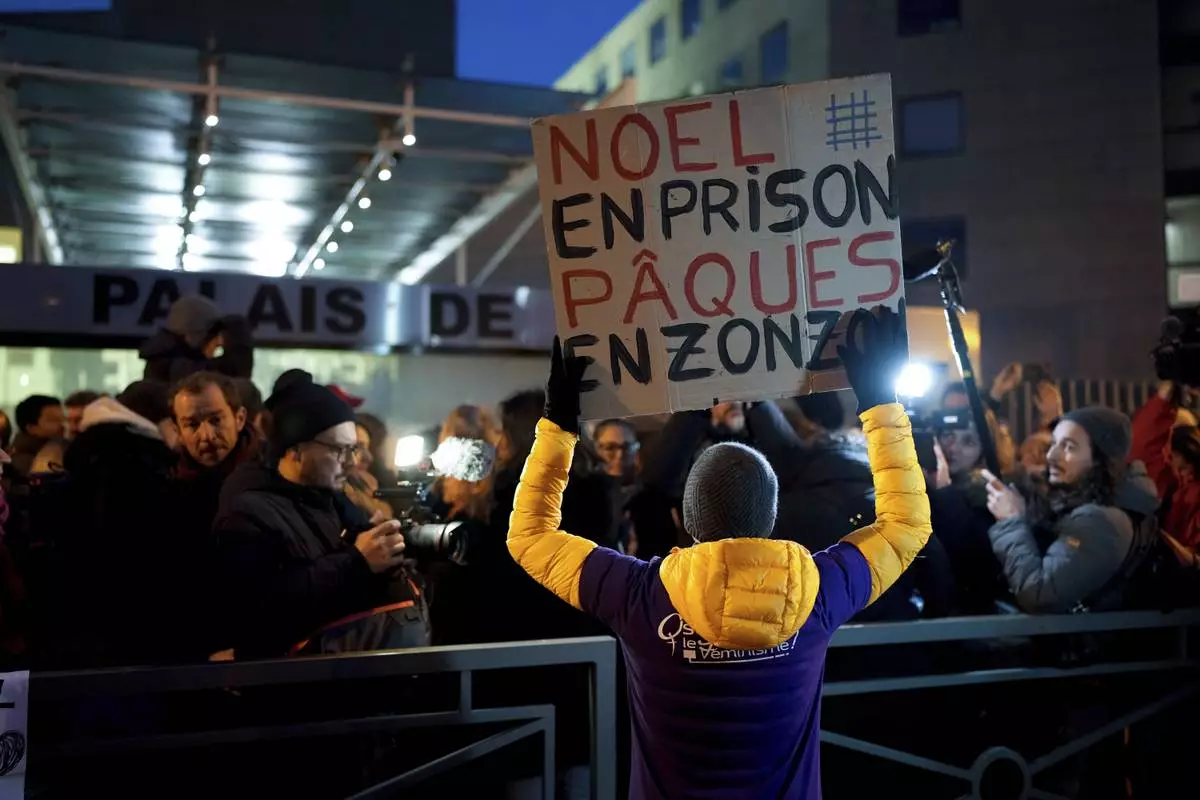
A man with a placard reading "Christmas in prison, Easter in the slammer" walks past the media as they wait outside the courthouse of Avignon during the trial of Dominique Pelicot, in Avignon, southern France, Thursday, Dec. 19, 2024. (AP Photo/Lewis Joly)
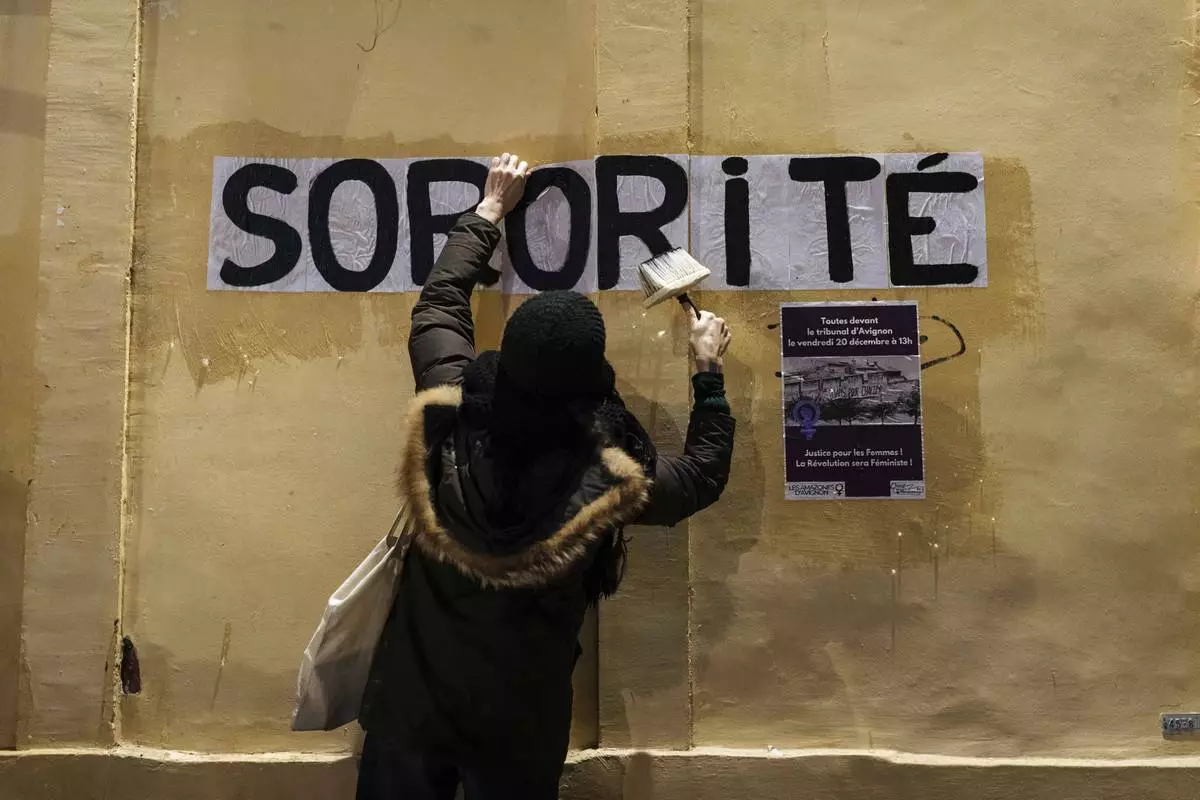
A member of the feminist collective "Les Amazones Avignon" sticks a message of support for Gisele Pelicot reading "Sorority" around the courthouse where the Mazan rape trial is taking place in Avignon, France, Wednesday, Dec. 18, 2024. (AP Photo/Lewis Joly)

FILE - A woman holds a placard that reads, "Thank you Gisele," outside the Palace of Justice during a women's rights demonstration, Dec. 14, 2024, in Avignon, southern France, where dozens of men are on trial in Avignon, accused of raping Gisèle Pelicot while she was drugged and rendered unconscious by her husband. (AP Photo/Aurelien Morissard, File)
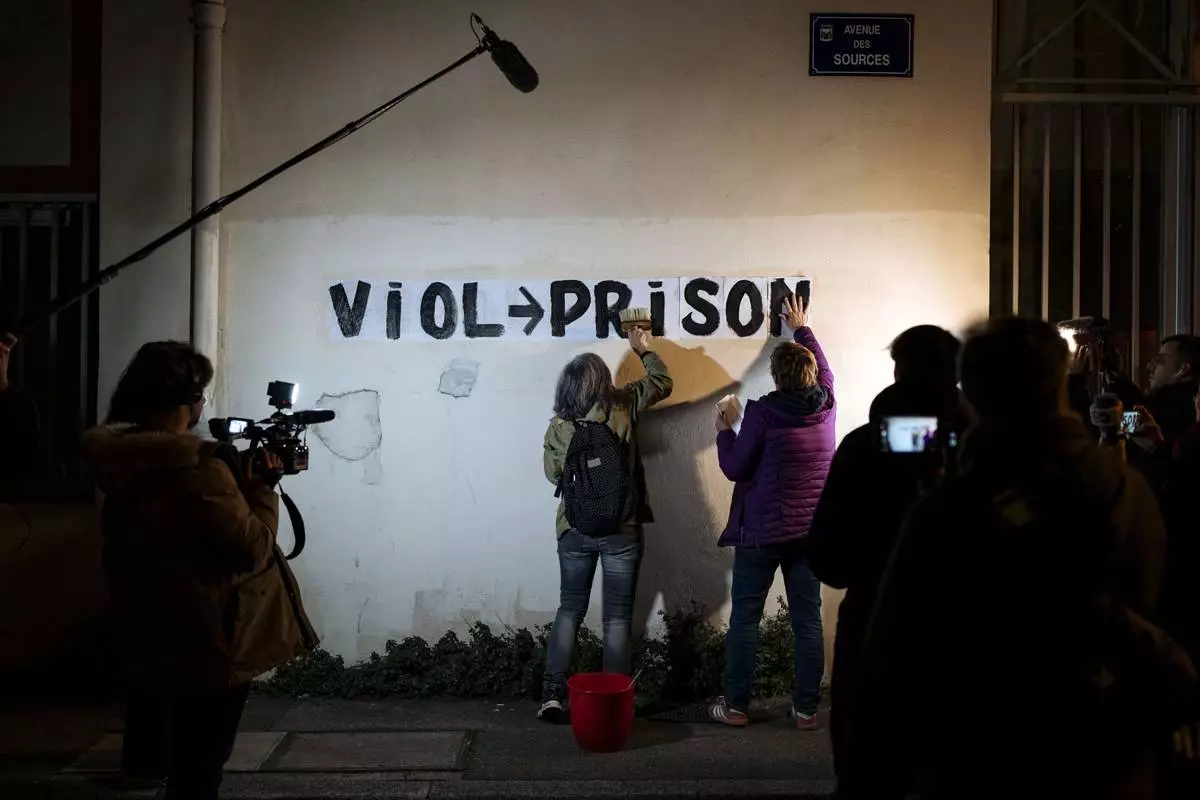
Members of the feminist collective "Les Amazones Avignon" attach a message of support for Gisele Pelicot reading "rape = jail" near the courthouse where the Mazan rape trial is taking place in Avignon, France, Wednesday, Dec. 18, 2024. (AP Photo/Lewis Joly)
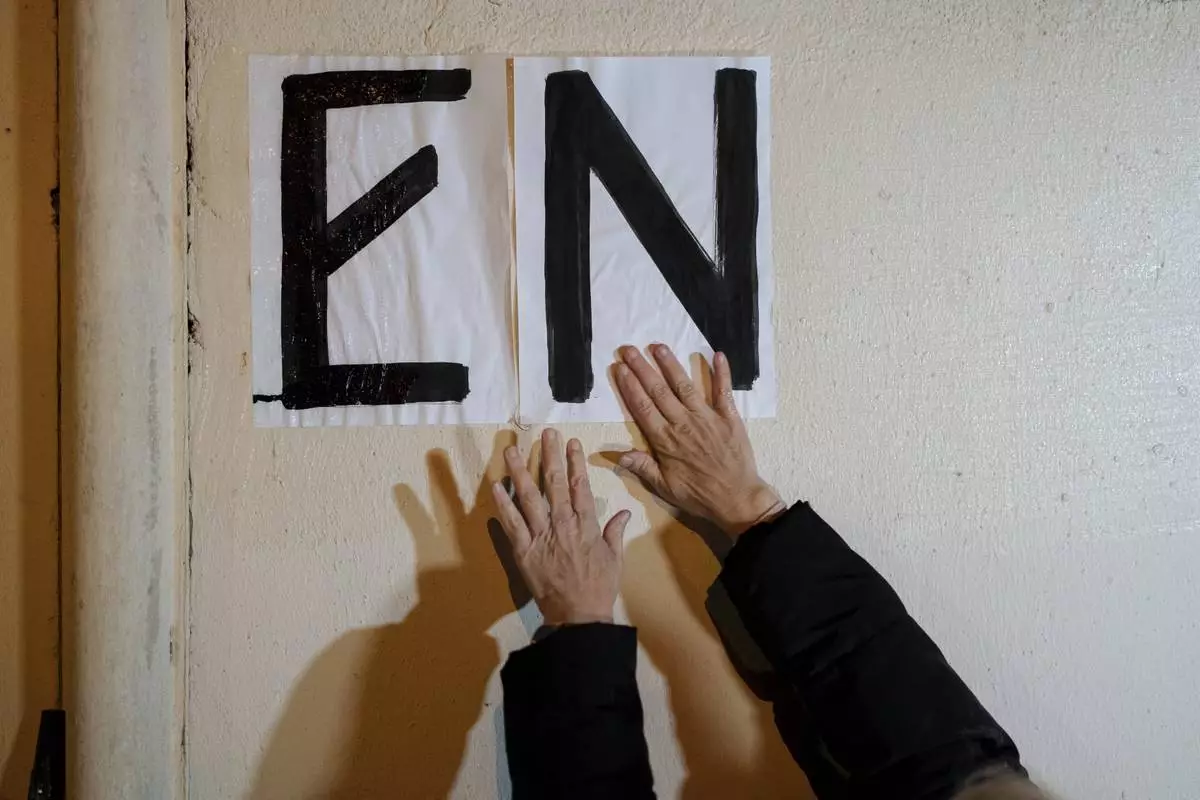
Members of the feminist collective "Les Amazones Avignon" attach a message for Gisele Pelicot near the courthouse where the Mazan rape trial is taking place in Avignon, France, Wednesday, Dec. 18, 2024. (AP Photo/Lewis Joly)

Members of the feminist collective "Les Amazones Avignon" stand by a message of support for Gisele Pelicot reading "Shame has changed side, what about justice ?" during their action of collage of messages around the courthouse where the Mazan rape trial is taking place in Avignon, France, Wednesday, Dec. 18, 2024. (AP Photo/Lewis Joly)
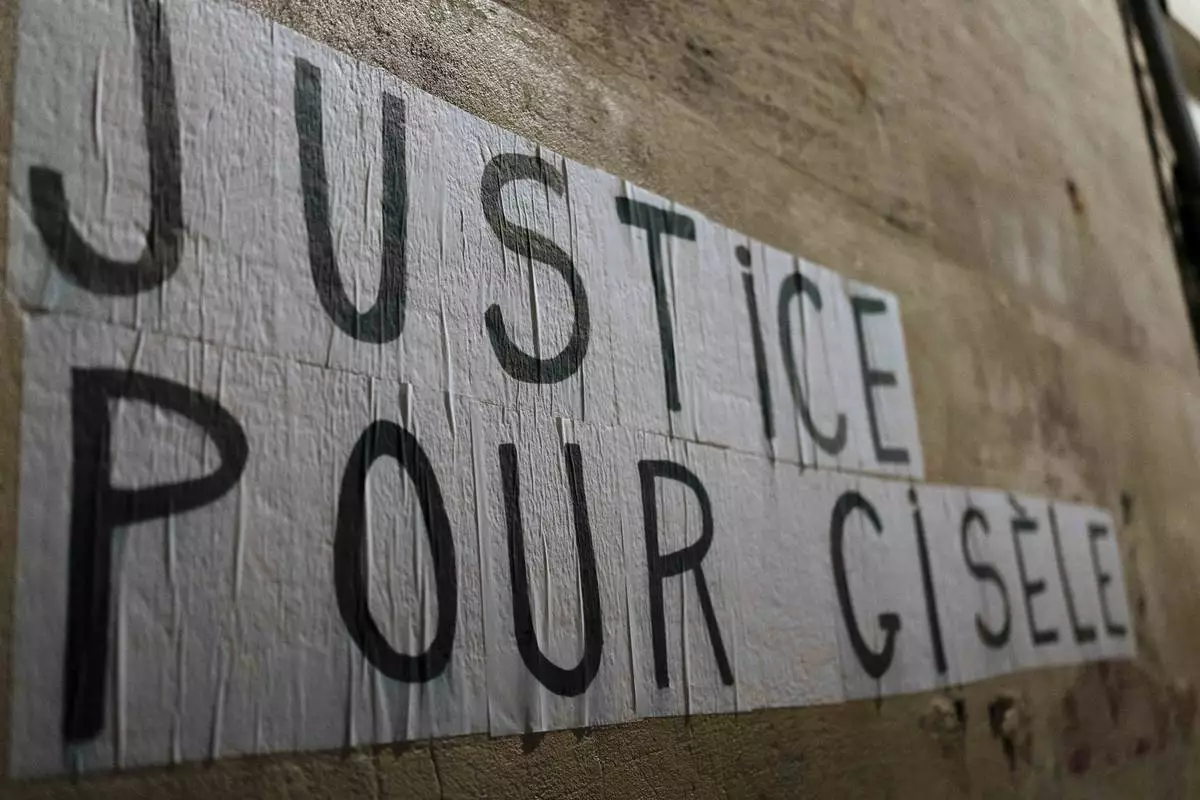
Members of the feminist collective "Les Amazones Avignon" stick a message of support for Gisele Pelicot reading "Justice for Gisele" in the streets around the courthouse where the Mazan rape trial is taking place in Avignon, France, Wednesday, Dec. 18, 2024. (AP Photo/Lewis Joly)
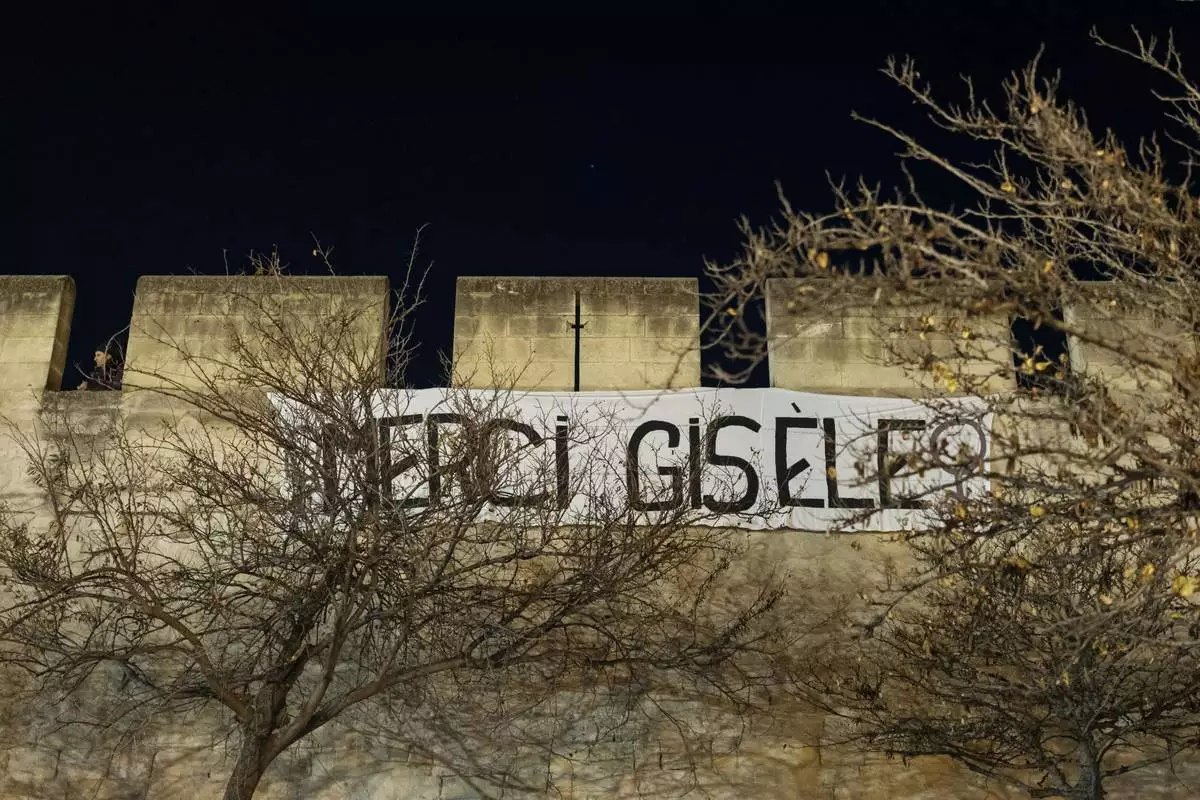
Members of the feminist collective "Les Amazones Avignon" hang a banner reading "Thank you Gisele" during their action of collage of messages of support near the courthouse where the Mazan rape trial is taking place in Avignon, France, Wednesday, Dec. 18, 2024. (AP Photo/Lewis Joly)
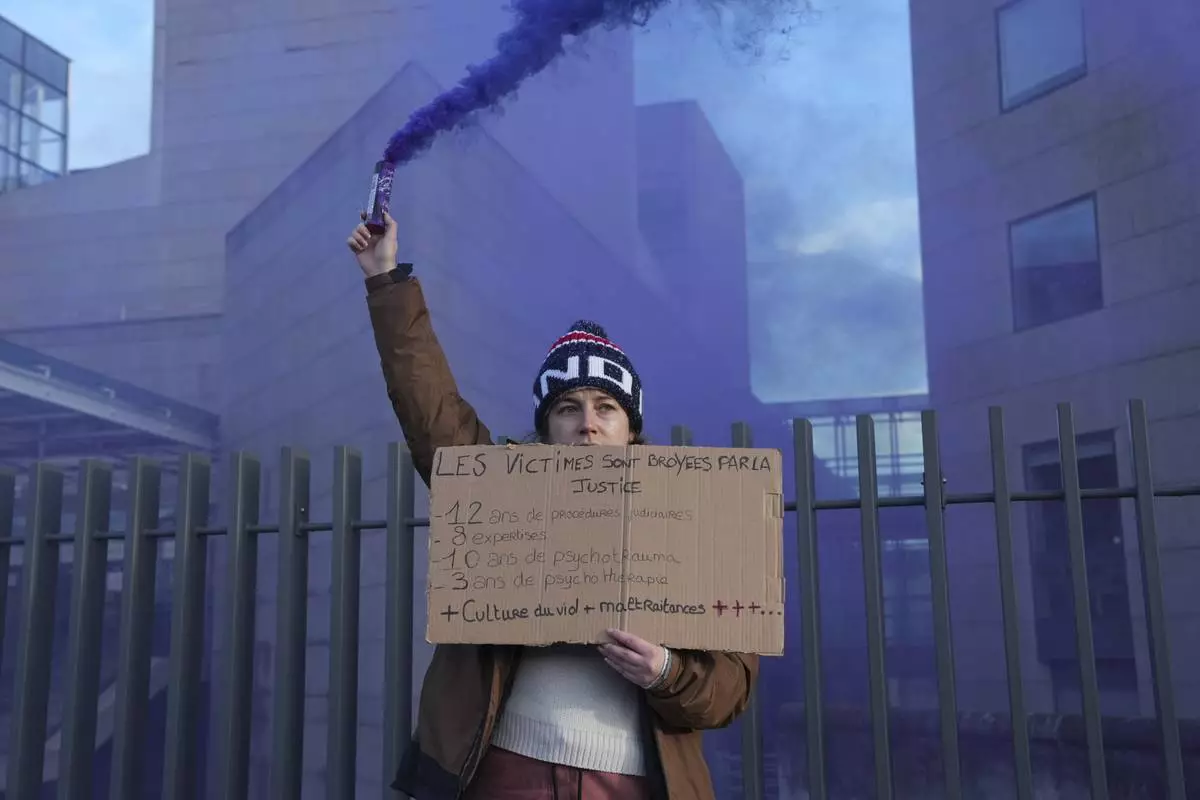
A woman fires a flare outside the Palace of Justice during a women's rights demonstration, Saturday, Dec. 14, 2024 in Avignon, southern France, where the trial of dozens of men accused of raping Gisèle Pelicot while she was drugged and rendered unconscious by her husband is taking place. (AP Photo/Aurelien Morissard)
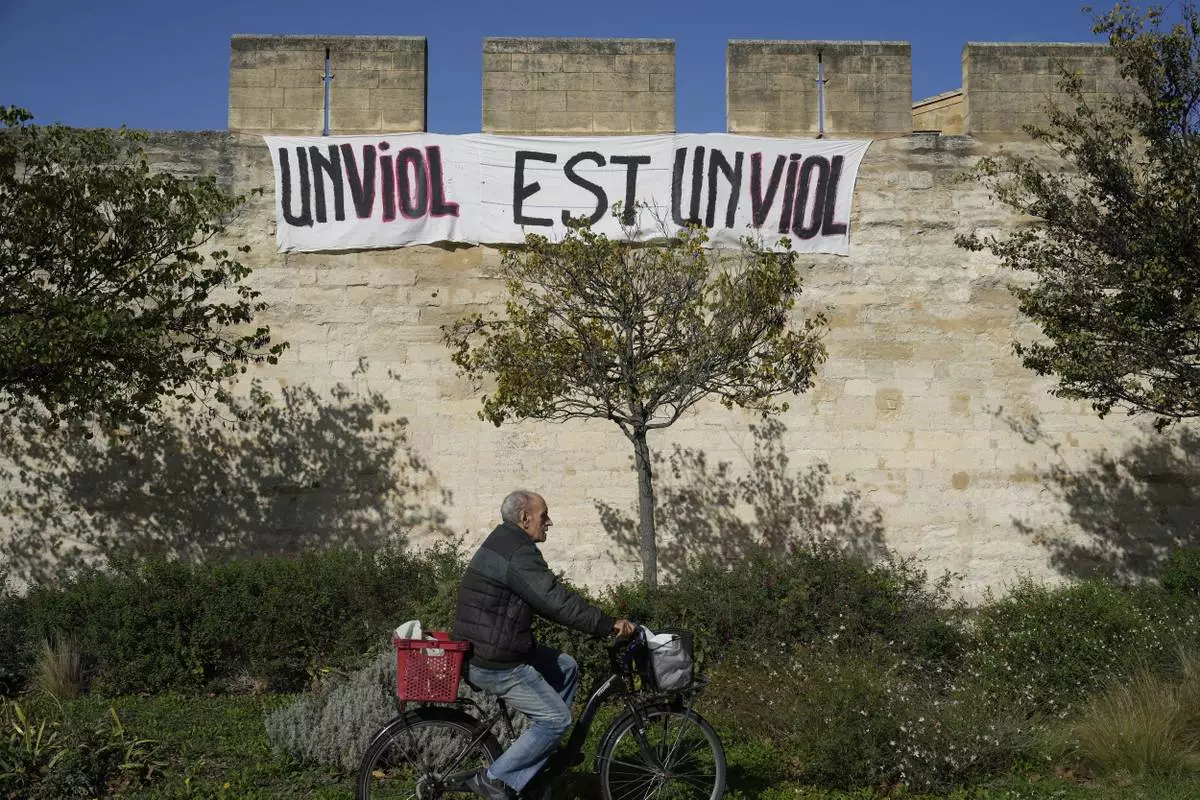
FILE - A man rides a bicycle in front of a banner that reads, "A rape is a rape," in Avignon, southern France, on Oct. 16, 2024. (AP Photo/Lewis Joly, File)
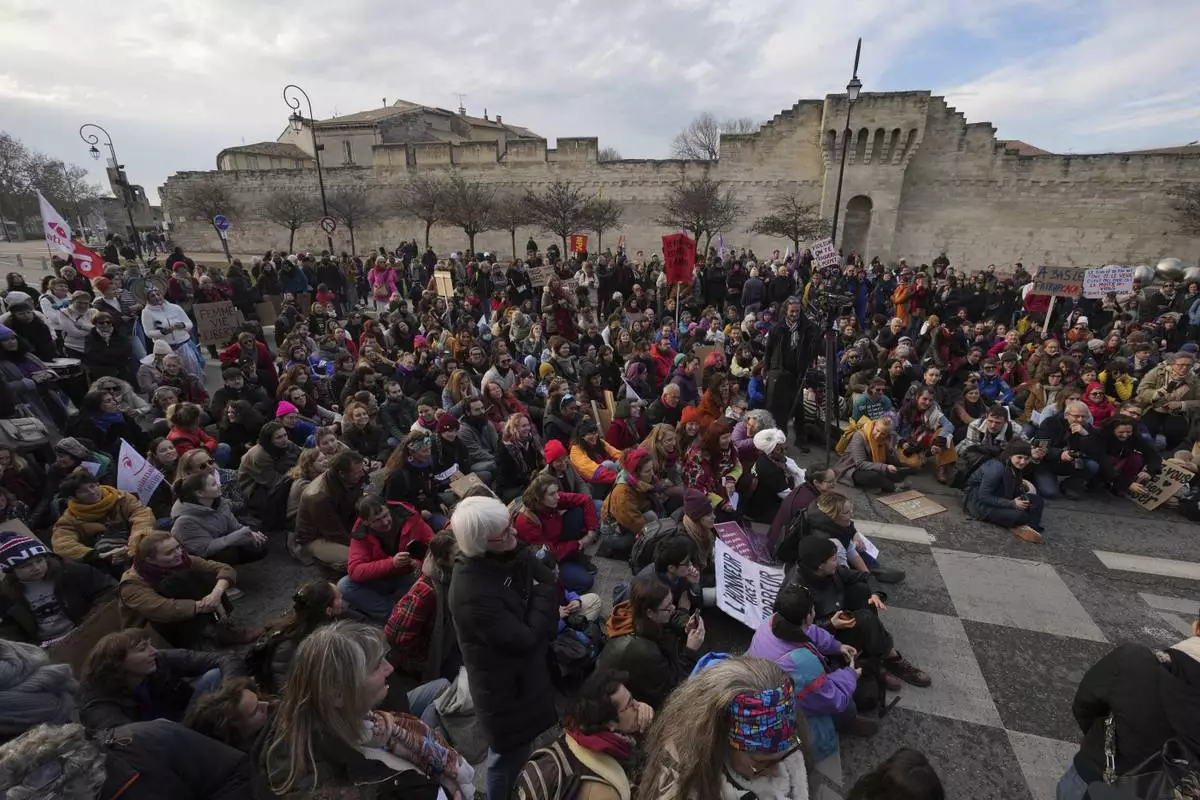
FILE - Activists gather during a women's rights demonstration, Dec. 14, 2024, in Avignon, southern France, where the trial of dozens of men accused of raping Gisèle Pelicot while she was drugged and rendered unconscious by her husband is taking place. (AP Photo/Aurelien Morissard, File)

FILE - People applaud Gisèle Pelicot, front right, who was allegedly drugged by her then-husband so that he and others could sexually assault her, leaves the courthouse in Avignon, southern France, on Dec. 9, 2024. (AP Photo/Lewis Joly, File)

FILE - Gisèle Pelicot, who prosecutors say was drugged by her then-husband so that men could rape her as she lay unconscious, leaves the courthouse in Avignon, southern France, on Oct. 16, 2024. (AP Photo/Lewis Joly, File)
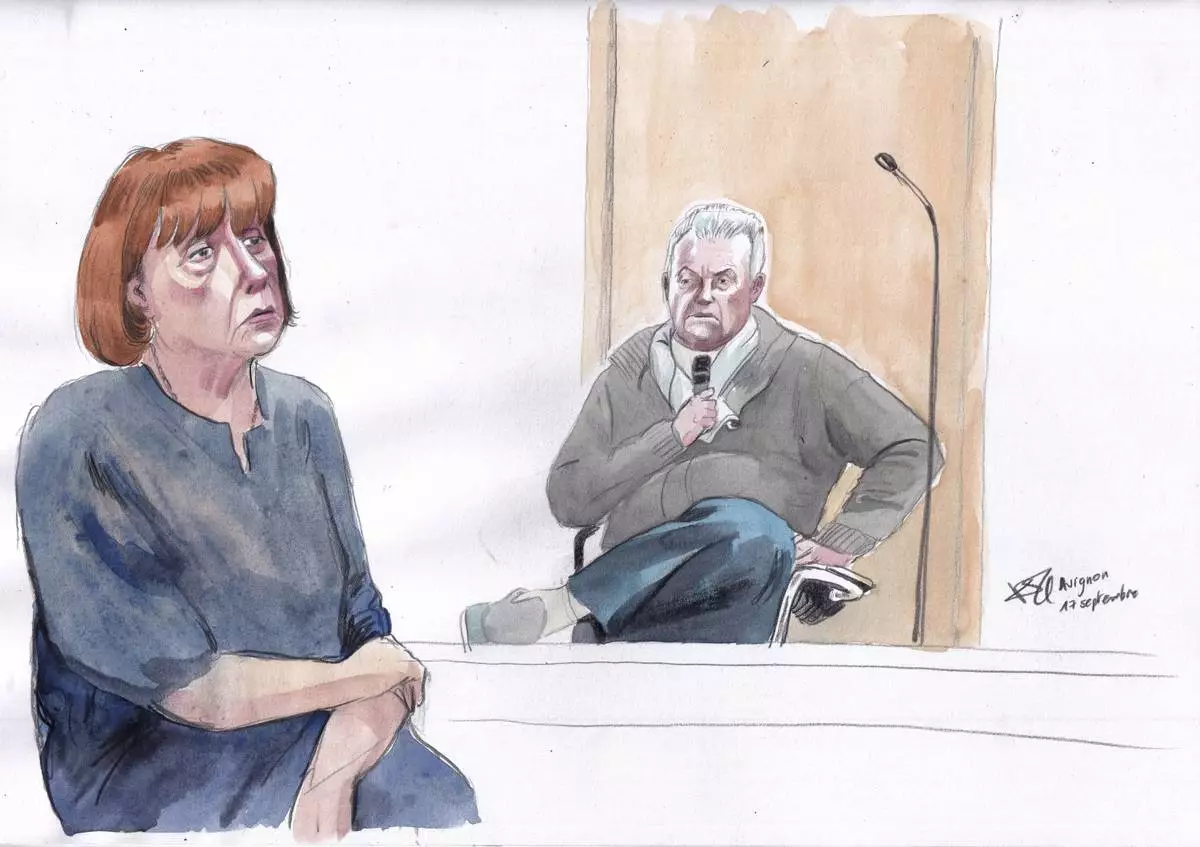
FILE - This courtroom sketch by Valentin Pasquier shows Gisèle Pelicot, left, and her ex-husband Dominique Pelicot, right, during his trial at the courthouse in Avignon, southern France, on Sept. 17, 2024. (AP Photo/Valentin Pasquier, File)








